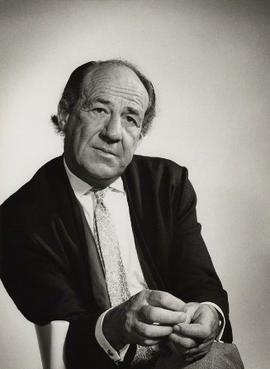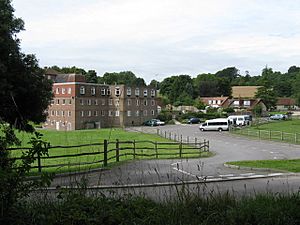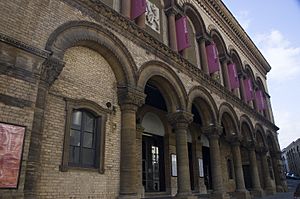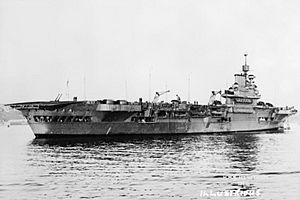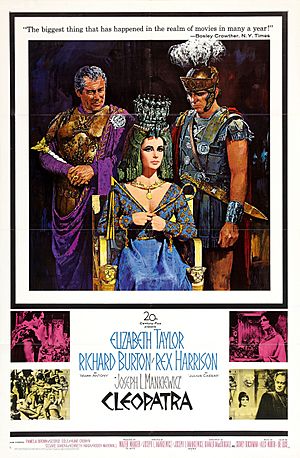Michael Hordern facts for kids
Sir Michael Murray Hordern (born October 3, 1911 – died May 2, 1995) was a famous English actor. His career lasted almost 60 years! He was especially known for acting in Shakespeare's plays, like playing King Lear. Michael Hordern also appeared in many films, starting with small parts and working his way up to leading roles. By the time he passed away, he had been in nearly 140 movies. Later in his life, he mostly worked in television and radio.
Michael Hordern was born in Berkhamsted, Hertfordshire. His family wasn't involved in theatre at all. He went to Windlesham House School and then Brighton College, where he became very interested in acting. After college, he joined an amateur acting group. Important Shakespearean directors noticed him and gave him small roles in plays like Othello and Macbeth. During World War II, he served in the Royal Navy on HMS Illustrious and became a lieutenant commander. After the war, he went back to acting and made his television debut. He often played small parts in many films, especially war movies.
In the early 1950s, Hordern became more famous after a theatre competition in London. This led to a year-long contract at the Royal Shakespeare Theatre. There, he played big roles like Caliban in The Tempest and Jaques in As You Like It. The next year, he joined a company at the Old Vic theatre. He played Polonius in Hamlet and the main character in King John. In 1957, he won an award for Best Actor for his role as a lawyer in The Dock Brief. While doing theatre, Hordern also had regular supporting roles in films like Cleopatra (1963) and A Funny Thing Happened on the Way to the Forum (1966).
In the late 1960s, Hordern worked with director Jonathan Miller on the TV show Whistle and I'll Come to You, which was highly praised. His next big play was Jumpers in 1972, where his acting was loved by critics. He played the role again four years later. Towards the end of his life, Hordern's TV work included Paradise Postponed, the award-winning Memento Mori, and the BBC show Middlemarch. He was honored with a CBE in 1972 and became a knight in 1983. Sir Michael Hordern suffered from kidney disease in the 1990s and died from it in 1995 at age 83.
Contents
Life and Career Highlights
Early Life and School Days
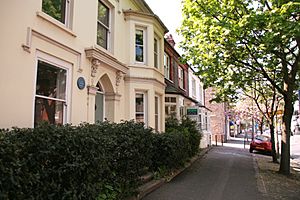
Michael Hordern was born on October 3, 1911, in Berkhamsted, Hertfordshire. He was the third son of Edward Joseph Calveley Hordern and Margaret Emily. His father's family had many church leaders. Edward Hordern joined the Royal Indian Navy and became a lieutenant. He met Margaret during a break at home, and they quickly married in Burma in 1903. They had two older sons, Geoffrey and Peter.
Michael's mother, Margaret, was related to James Murray, an Irish doctor. He invented milk of magnesia in 1829, which helped with stomach problems. This invention made the family very wealthy. Margaret grew up in England and went to St Audries School for Girls.
When Michael was born, his father was still working abroad. Edward was promoted to captain and earned a good salary. The family lived comfortably with servants. In 1916, Margaret went to India to visit her husband. Her short trip lasted two years because of World War I. While she was away, Michael, at age five, was sent to Windlesham House School in Sussex. He was too young for full studies but enjoyed activities like swimming, football, rugby, and fishing.
After a few years, he and a friend started the "A Acting Association" (AAA). This group organized school plays. Hordern also put together a team of actors, including himself, to perform plays they wrote and directed. He stayed at Windlesham House for nine years and said he had "enormous fun" there.
Michael was 14 when he moved to Brighton College. By then, he was very interested in acting. In his 1993 book, A World Elsewhere, he wrote: "I didn't excel in any area apart from singing; I couldn't read music but I sang quite well." At Brighton College, he helped put on amateur Gilbert and Sullivan operas. He played the Duchess in The Gondoliers. His performance was a success, and he joined the men's chorus in Iolanthe. He also appeared in The Mikado and played the Major-General in The Pirates of Penzance. He later said this was the start of his career.
When World War I ended in 1918, his father, Edward, arranged for Margaret to return to England. She brought home an orphaned baby girl, Jocelyn, whom they adopted. The next year, Edward retired and moved the family to Haywards Heath in Sussex. There, Michael developed a strong love for fishing, which he enjoyed for the rest of his life.
Hordern wrote in his book that his family wasn't interested in theatre. He didn't see his first professional play until he was 19. Around this time, he met Christopher Hassall, a fellow student who later became a successful actor. Hassall helped Hordern decide to become an actor. In 1925, Hordern's family moved to Dartmoor and turned an old barn into a farmhouse. This was perfect for Hordern, who loved fishing and exploring the countryside.
Starting His Acting Journey (1930s)
Michael Hordern left Brighton College in the early 1930s and got a job as a teaching assistant. He joined an amateur acting group and performed in a play called Ritzio's Boots. The play did well in a competition, but lost to another play. Hordern wrote a very negative review of the winning play, which led to a legal case for slander. Hordern won the case. Years later, he met the writer of the play, who thanked him because the court case gave him a lot of publicity and helped his career.
After his mother passed away in 1933, Hordern decided to become a professional actor. He briefly worked at another school but fell ill with a serious sickness. After recovering, he became a traveling salesman for a family business. While working in Stevenage, he joined another amateur theatre group. He acted in Journey's End and Diplomacy. These plays helped him learn how to work with a cue-script, which was useful throughout his career. That summer, he joined a Shakespearean theatre company that toured old stately homes. He played Orlando in As You Like It and co-starred in Love's Labour's Lost. He admired his co-star, Osmond Daltry, who influenced his Shakespearean acting.
Hordern also joined the St Pancras People's Theatre in London. He enjoyed his time there, even with the long commute. By the end of 1936, he left his sales job to act full-time. He moved to a small flat in London, hoping to make a name for himself on stage.
Hordern's first London stage appearance was in January 1937. He was an understudy in Night Sky at the Savoy Theatre. When he wasn't acting, he worked as an assistant stage manager. In March, Osmond Daltry, who had started his own company, cast Hordern as Ludovico in Othello. This was Hordern's first paid acting role for a theatre company. The play was a success. When the main actor had to leave, Hordern took over his role.
After Othello, Daltry's company toured Scandinavia with two plays. Hordern felt this was a turning point in his career. Back in London, after a short time without work, he was offered a part in a play called Ninety Sail, but it was canceled on the day he was supposed to start.
Bristol Repertory Theatre
In mid-1937, theatre owner Ronald Russell offered Hordern a role in his acting company, the Rapier Players, in Bristol. Hordern's first role was Uncle Harry in Someone at the Door. Because the play was popular, Russell kept casting him in similar "uncle" roles. This made Hordern frustrated, as he wanted to play the leading man. While with the Rapier Players, Hordern fell in love with Eve Mortimer, a young actress who played small parts.
Hordern found his time with the Rapier Players very valuable. He learned how a professional theatre company worked with strict deadlines and budgets. Rehearsals were long because of mistakes. He noted that the stage props were well-made, even though they were bought cheaply.
After a short holiday with Eve in 1938, Hordern returned to London. He appeared in Quinneys, a radio play for the BBC. He then went back to Bristol for the next season with the Rapier Players. One play, Love in Idleness, where Hordern played the main character, was praised by critics.
By the end of 1938, Hordern's father had moved to a cottage near Bath, Somerset. This was convenient for Michael, who used it as a base while performing with the Rapier Players. He played a supporting role in an adaptation of Cold Comfort Farm. He enjoyed this role, and the cast loved the modern script, but the audience did not, as they expected it to be exactly like the book.
World War II and First Films
In 1939, Hordern and Eve moved to Harrogate. When war broke out, Hordern volunteered for the Air Raid Precautions (ARP), but he felt it wasn't helping enough. He decided to join the Royal Navy as a gunner. While waiting to be accepted, he and Eve found an advertisement for actors in Bath. They became the leading man and lady for a company there. Their first and only play was Bats in the Belfry. Hordern was thrilled to finally be a leading man, but his joy was short-lived when he was called to duty in December. He asked the navy for permission to finish his play and appear in his first film, Girl in the News. His request was granted, and he reported for duty in early 1940.
In 1940, after a small stage role, Hordern played a small, uncredited part in the comedy film Band Waggon. Soon after, he began naval gunnery training on a ship that delivered ammunition. He found that his middle-class background helped him get along with his commanding officers.
By 1941, radar was being used in the Navy, and Hordern became one of the first operators to report enemy movements to the RAF. He believed he got the job because of his clear speaking voice. His superiors were so impressed that by early 1942, he became a Fighter Direction Officer and then a first lieutenant on HMS Illustrious. He was later promoted to lieutenant commander, a rank he held for two years. Besides his naval duties, he was also the ship's entertainment officer, organizing shows for the crew.
Marriage and Post-War Acting
During a visit to Liverpool in 1943, Hordern proposed to Eve. They married on April 27, 1943. After their honeymoon, Hordern went back to his duties on Illustrious, and Eve returned to theatre work. After the war ended in 1945, Hordern worked briefly as a ship dispatcher. The Horderns rented a flat in London, and he started looking for acting jobs. He was soon offered his first television role, playing Noah in a play. Hordern was nervous about this new medium and found it tiring, but he was paid well.
In 1946, Hordern played Torvald Helmar in A Doll's House. Then he played Richard Fenton in Dear Murderer, which was a success and ran for 85 performances. Critics praised Dear Murderer, and one reporter said Hordern brought "sincerity to a difficult role." The next month, Eve gave birth to their only child, a daughter named Joanna. That Christmas, he played Nick Bottom in a festive version of The Fairy-Queen. This was the first performance by the Covent Garden Opera Company, which later became The Royal Opera.
In 1947, Hordern took a small part in the film Noose. He also played Maxim de Winter in a TV version of Rebecca and a detective in Good-Time Girl. The next year, he was in three plays: The Indifferent Shepherd, Ghosts, and an adaptation of The Wind in the Willows at the Royal Shakespeare Theatre. In The Wind in the Willows, he played the lively Mr Toad.
In early 1949, Hordern appeared in the comedy A Woman in Love, but he didn't enjoy it because of problems between the director and the star. Next, he had a small role in the well-known Ealing comedy Passport to Pimlico. He described his performance as "tense and hyperactive."
Becoming a Star in Theatre and Film (1950s)
By the 1950s, many important directors noticed Michael Hordern. He felt this decade was very important for his career. It began with a major role in Anton Chekhov's Ivanov in 1950. The play was exciting because it hadn't been performed in England for 25 years. Critics praised Hordern's performance. His next role was the main character in Macbeth. While critics didn't like the overall production, they found Hordern's acting "deeply moving."
In 1951, Hordern was hired for the lead role in Saint's Day, a play entered in a theatre competition. The play was popular with audiences, but theatre critics disliked it for winning. This made famous actors Laurence Olivier and John Gielgud write letters to the press complaining about the critics.
Shakespeare Memorial Theatre
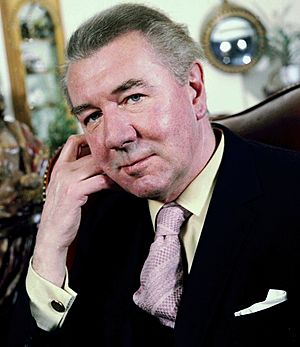
Hordern said the negative publicity from Saint's Day actually helped his career. It brought him to the attention of director Glen Byam Shaw, who cast him in several plays at the Shakespeare Memorial Theatre in 1951. These roles included Caliban in The Tempest, Jaques in As You Like It, and Sir Politick Would-Be in Volpone. Hordern admitted he didn't know much about Shakespeare's plays and asked friends for advice. That same year, he filmed Scrooge, an adaptation of A Christmas Carol, where he played Marley's ghost. Critics had mixed feelings about the film, but many praised Hordern's "brilliantly played" role as Marley's ghost.
The Horderns moved to Stratford for the theatre season. Hordern felt unsure about his acting when comparing his Caliban to Alec Guinness's earlier performance. But the director reassured him. He was thrilled to receive a letter from Michael Redgrave, who praised his Caliban as "immensely fine." As the season continued, Hordern received more praise for his roles.
The Old Vic and Hamlet
Hordern's contract at the Shakespeare Memorial Theatre ended in mid-1952. He then joined Michael Benthall's theatre company at the Old Vic in London. Their first play was Hamlet, which opened in September 1953. Hordern called it "the perfect play" to start the season. The play then moved to Edinburgh before returning to London. Hordern received mixed reviews for his role as Polonius. After Edinburgh, Hamlet toured and had a successful run of 101 performances.
In 1953, the Danish government invited Benthall's company to perform Hamlet for the Norwegian Royal Family. Hordern generally enjoyed his time in Hamlet, but he had a difficult relationship with his co-star, Richard Burton. Hordern noted Burton's "charm and charisma" but found him easily annoyed. Hordern described their working relationship as "love-hate," with each being a bit jealous of the other's success. Years later, when Burton went to Hollywood, he recommended Hordern to casting directors, leading Hordern to appear in six of Burton's films.
Next for Benthall's company was King John, which opened in October 1953. Hordern took over the lead role from a young, inexperienced actor. Hordern found King John to be a "difficult play." At the same time, he was also filming Forbidden Cargo. This busy schedule made him exhausted, and he was advised to reduce his workload.
Films and 1950s Theatre

Hordern felt the 1950s was a good time for films, even though he didn't particularly love the medium then. He disliked his own physical appearance on screen and preferred radio because audiences only heard his voice, which he considered his best feature. He also felt more personal satisfaction from theatre than from film. He was good at learning lines, which was helpful for film scripts that often changed. He enjoyed the challenge of making the most of a scene and hitting his marks for the camera. After a bad experience with a play called Nina, Hordern decided to focus on his film career.
By 1953, Hordern was appearing in three to four films a year, and this number grew. In 1956, he had a leading role in The Spanish Gardener, filmed in Spain with Dirk Bogarde. The New York Times called Hordern's role as the strict Harrington Brande "an unsympathetic assignment" but said the actor did "quite well." By the mid-1950s, Hordern was known for being reliable. He was offered many roles, including Demosthenes in Alexander the Great and Commander Lindsay in The Night My Number Came Up (both 1956). He also appeared in two films in 1957: No Time for Tears and Windom's Way.
World War II films were very popular in the 1950s. Hordern said everyone had a story about the war, whether it was about love, loss, or tragedy. His own naval experience was helpful when he was cast in many war films, such as The Man Who Never Was, Pacific Destiny, The Baby and the Battleship (all 1956), and I Was Monty's Double (1958).
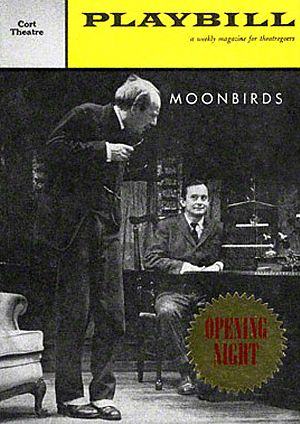
In 1957, Hordern played a lawyer in John Mortimer's play The Dock Brief. After good reviews, it was broadcast on radio and then television. Hordern won a Best Actor Award for it in 1958. The Horderns moved to Donnington, Berkshire in 1958, where they made three cottages into one large family home.
The year 1959 was difficult for Hordern professionally. He returned to the stage in The Magistrate, which received mixed reviews. Some critics thought Hordern was miscast. He also received critical reviews for his role as Pastor Manders in Ghosts and for playing Macbeth. Critics found his Macbeth to be "unintended comic."
On October 9, 1959, Hordern made his Broadway debut in the comedy Moonbirds. The play was a disaster and closed after only two nights. Critics did praise Hordern's performance, but he wasn't sure why the play failed, blaming personality clashes.
Cleopatra and the 1960s
In 1960, Hordern played Admiral Sir John Tovey in the war film Sink the Bismarck!, which reminded him of his naval days. After a few smaller roles, Hordern began working on the American historical drama film Cleopatra in 1962. He called it "the most extraordinary piece of film-making." He played the Roman speaker Cicero and was hired for an eight-week contract. But due to problems like cast sickness and bad weather, it was extended to nine months.
To Hordern's annoyance, he had to work with Rex Harrison again, who played Caesar. Despite their past problems, they agreed to work together. However, Harrison made a drunken joke about a past play, and Hordern got angry and hit him. Hordern almost got fired, but the issue was quickly resolved, and they were kept separate during filming. In 1993, Hordern said the incident "cleared the air," and they eventually became friends. After Cleopatra, Hordern appeared in many other films, including The Spy Who Came In from the Cold (1965), Khartoum (1966), How I Won the War (1967), Where Eagles Dare (1968), and Anne of the Thousand Days (1969). He also starred in the Roman comedy A Funny Thing Happened on the Way to the Forum in 1966.
Hordern first met director Jonathan Miller in 1968. Miller, who admired Hordern, offered him the role of Professor Parkin in his TV drama Whistle and I'll Come to You. Hordern liked Miller's way of working, which allowed him to improvise. He wrote that he had never experienced such freedom. The show was released in late 1968 and was a hit. Critics called it "a masterpiece of economical horror." The year ended with a role in A Delicate Balance, which received mixed reviews.
Later Career: 1969–1990
King Lear and Jumpers
Jonathan Miller and Hordern worked together again in 1969 on King Lear at the Nottingham Playhouse. Hordern immediately accepted the main role, though he later said he never really liked playing the character. He called working with Miller "one of the most exhilarating and funny experiences." Miller made the fool character an intimate friend of Lear's, rather than a servant, which was unusual for Shakespearean plays. Miller focused on the relationships between characters instead of fancy sets and costumes. This style was also used when the play was shown on TV later.
When King Lear played at the Old Vic in 1970, reviews were mixed. Some liked the simple sets and costumes, while others did not. However, critics praised Hordern's performance. One critic called his portrayal "a magnificent creation." Hordern played Lear again in 1975 for a BBC television series.
In 1971, playwright Tom Stoppard asked Hordern to play a main part in his new play, Jumpers. It was a funny play about academic philosophy. Hordern was to play George Moore, a confused philosophy professor. Hordern thought the play was brilliant, but he didn't understand the complex script at first. His co-star was Diana Rigg.
Jumpers was set to open at the Royal National Theatre in 1972. The theatre's director, Laurence Olivier, called the play "unintelligible" and walked out of the first read-through. Despite this, rehearsals continued, which the cast found difficult because of the complicated script. Hordern wrote that he struggled to understand it. Olivier later asked Stoppard to shorten the play, which angered Hordern because it meant learning new lines quickly. The opening night was a huge success, and Hordern called it "unbelievable, one of the highlights of my career." The play won an award for Best Play.
Voice Work and Return to Stratford
Between 1973 and 1981, Hordern was the voice of Jeeves in the BBC radio series What Ho! Jeeves. In 1974, he narrated several other BBC programs. In 1975, Hordern played the judge in the play Stripwell. He found this role too similar to his own personality. His time in the play was difficult due to personal problems, but he and his wife soon reconciled. Critics praised his performance in Stripwell.
Later in 1975, Hordern narrated Barry Lyndon, Stanley Kubrick's film based on a novel. A critic said Hordern's narration was "witty and ironic." That same year, Hordern narrated 30 episodes of the children's animated series Paddington, based on the Paddington Bear books. In his 1993 book, Hordern wrote that he enjoyed working on Paddington and loved both comedy and drama.
In 1976, Hordern joined the RSC in Stratford-upon-Avon. He played Prospero in The Tempest. He also appeared in Love's Labour's Lost with Alan Rickman and Zoë Wanamaker. Hordern was the oldest member of the company and found it hard to get used to the younger actors' attitudes. He felt it was different from the 1950s, less personal, and lacked good morale. He compared it to being on a battleship far from land. Later in 1976, Hordern played the king in the musical film The Slipper and the Rose, a version of Cinderella. He also returned to his role as George in Stoppard's Jumpers. Critics enjoyed the revival, and Hordern compared it to the 1972 version.
Television and Radio (1980s)
In 1981, Hordern played Gandalf in the BBC radio adaptation of Tolkien's The Lord of the Rings. The BBC had a large budget, attracting famous actors. The series had 26 episodes and was very popular. One author called Hordern's Gandalf one of the most powerful characters. His co-star, Ian Holm, said Hordern played the role in a "grand, rather old fashioned way." Hordern himself said playing Gandalf was "a bit of a slog."
Hordern and Jonathan Miller worked together one last time in 1982 for a BBC TV version of King Lear. Hordern felt this was his best performance as Lear, saying that as he got older, he understood the character better. One writer said Hordern played the king "straight up with no gloss" and was "forceful when he should be forceful, compassionate when he should be compassionate."
In January 1983, Hordern was knighted, which he called "a great thrill and [a] surprise." That year, he became popular with children as the voice of Badger in the ITV film The Wind in the Willows. He then played Sir Anthony Absolute in The Rivals and received excellent reviews. He was nominated for an award but did not win. His success was mixed with personal sadness; his wife Eve became ill and needed constant care. She passed away in 1986.
Paradise Postponed and You Never Can Tell
In 1986, John Mortimer, a writer Hordern greatly respected, cast him in Paradise Postponed. This was an eleven-part TV drama that took a year to make. Hordern played Simeon Simcox, a left-wing vicar. Hordern described himself as having "prejudice rather than principle," so he didn't have much in common with his character. However, he felt great empathy for Simcox and admired his "plain, straightforward attitude to life" and his strong faith.
Hordern returned to the London stage in 1987 after four years. He starred in You Never Can Tell. This was his second time in the play; fifty years earlier, he had played the young lead. This time, he played William, the elderly waiter. He found this role challenging because of the many meals he had to serve while remembering complex lines. He enjoyed the play's successful run and was happy to reunite with old friends in the cast. Hordern admitted the experience made him feel "a little happier" about life.
Final Years and Passing
By the early 1990s, Michael Hordern focused more on television. He often played older characters like teachers, bank managers, politicians, and clergymen. In 1989, he appeared with John Mills in Ending Up, a story about older people living in a retirement home. After that, he played Godfrey Colston in Memento Mori, a TV film about elderly friends. His performance was called outstanding. In his next role, as the wealthy Peter Featherstone in Middlemarch, he mostly had to lie in bed and pretend to die. He felt this kind of role was fitting for his age and was grateful to still be working at 81.
In January 1995, Hordern was invited back to his old college in Brighton. A room was named in his honor, and a bronze bust of him was displayed there. Hordern's last acting role was as Lord Langland in the comedy film A Very Open Prison. He then did two narration performances: Spode A History of Excellence and Dinosaurs and Their Living Relatives.
Michael Hordern passed away from kidney disease on May 2, 1995, at the age of 83. He had been suffering from a long illness and receiving treatment.
See also
 In Spanish: Michael Hordern para niños
In Spanish: Michael Hordern para niños
 | Claudette Colvin |
 | Myrlie Evers-Williams |
 | Alberta Odell Jones |


